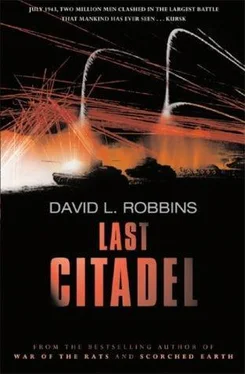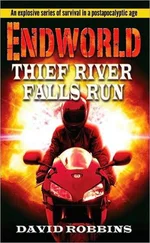On the right-hand side of the SS advance, battle group Kempf was also lagging, staggering far to the south, running behind every schedule and plan. Totenkopf, Das Reich , and Leibstandarte were outpacing their mates, exposing their vulnerable flanks left and right, like a spear stabbing alone through the Russian defenses. Major Grimm could find nowhere to bang his fist, the game board would have been upset, so he pounded the walls. Breit showed no emotion, only a keen raptor’s eye for information. The entire first day and into the evening, Luis read the messages in a calm voice, supervised the long sticks, and kept his own counsel, absorbing the others’ anger and frustration to feed his own.
On the northern shoulder of the bulge, Colonel General Walter Model achieved nothing to match the penetration into the Soviet defenses by the SS divisions in the south. The lines on Luis’s map in the northern salient resembled more a sag, like a wet ceiling. First, Model was bogged in the town of Ponyri, a blazing battle of tanks and infantry, then he’d been stymied outside the town of Ol’khovalka right at the tip of his advance. The movement of Model’s 11th Army across the big map was globular and slow, not the lightning flash of Blitzkrieg at all. Luis gazed over the little blots of red that held back the unprecedented might of Germany. The reports streaming in to the situation room told the story in bald detail. Model was safeguarding his tanks, keeping them away from the points of attack, using infantry instead to punch through Russian lines, exploiting with his tanks only when there was an opening.
This was not working and could not work – Luis realized this first, hours before Grimm began to bleat about it – not against the immense depths of the Russian defense belts. Infantry on foot were getting chewed up in those thousands of miles of trenches and millions of mines. Tanks, he thought without speaking, watching every flow and recoil of the black blocks in the north. Look at what the SS has done there in the south, look at the pace and ferocity of the assault. The SS uses the bludgeon of the tanks: Mark IVs in the lead in wedge formation, Tigers in the center, this is the Panzerkeil , the armored battering ram. Infantry follows closely, neutralizing the trenches, swarming into the breaches cut by the tanks, holding the gains while the tanks move on. That’s how you cut the Soviets to pieces, that’s how you smash those red blocks into splinters. Tanks, he thought, and the SS. And hatred.
On the second and third days of Citadel, the tendencies set out on the map in the first morning of the German attack played themselves into themes. In the north, Model had advanced his 11th Army no more than fifteen kilometers, then ground to a stop after sacrificing fifty thousand men and four hundred tanks. By the morning of July 8, any possibility of reaching Kursk lay only in the south, with Papa Hoth and his 4th Panzer. But on Papa’s right, Kempf continued to drag behind. The three SS divisions at the vanguard of the assault turned increasingly to the northeast, toward Prokhorovka and away from Kursk, to face the Soviets hacking away at their flanks. Totenkopf was ordered to fall back, given the task of protecting the right flank where Kempf’s army should have been, thus subtracting one SS division from the crest of the advance. On the SS left flank, the 48th Panzer Corps finally broke across the Luchanino River, made progress along the Oboyan road, and linked up with Leibstandarte and Das Reich . But slowly they, too, began to face difficulties. Over the hours it became clear that they could not keep up with the hard-driving SS. Germany’s elite SS Panzer Divisions became more exposed with each kilometer they took. Every incident, attack and counterattack, advance and retreat, all the high ground gained and lost, casualty counts, tank and field-gun losses, repairs, air assaults, every meter of battleground wrested from the Russians by the dying flowed through Luis’s thin touch. He stood by the sprawling map watching the developing carnage and defeat for Germany. Through three short nights and long hot days, all of it vicious for the mounting cost, he handled every message with increasing dread, not only for the miserable news the pages brought to the map but afraid the next sheet would announce the American invasion in Italy, and that would toll the bell on his chance to enter the battle; his second time in Russia would end as fruitlessly as did his first, without a wound this time but also without honor. Luis was helpless, and this was a silent misery for him because he felt strong, growing in power even while Germany struggled, even sleepless as he was, the beat in his hand nudging him, to do what? He was forced to stand by and watch the bull be butchered, knowing if he could only run into the arena he could achieve something, save something, perhaps the day, perhaps Germany, certainly his dream of glory. The map of war was not war, and he knew God did not have a map in mind when He brought Luis back to Russia.
At dawn of the fourth morning beside the teetering chart, Luis took in the message that unleashed him.
Erich Thoma lay in a Belgorod hospital, a bullet through his neck. The note was written by Thoma himself, asking Luis to come.
Luis did not relay this information to the two intelligence officers grinding their teeth beside the map. Major Grimm was a mess, untucked and occasionally forced to leave the map room just to mop his anxiety and restore his uniform to some military decorum. Slipping the location of the hospital into his pocket, Luis approached Major Grimm.
‘Major.’
The heavy man raised his gaze to Luis; eyes and cheeks and chin were swollen as though Grimm were a sponge and all the failure on the map was soaked into him, to seep out his pores in the Russian summer. Luis felt like an icicle beside this bloat.
‘Captain.’
‘I would like an hour, sir. May I be excused?’
‘No!’ the major snapped. He shot a hand at the map. ‘Look. Look for yourself, Captain de Vega. Where is there an hour for you to take?’
‘Go.’
Colonel Breit spoke from across the room, behind his cigarette, a dispassionate voice drilled through the tobacco cloud above the map. ‘He’s been here more than both of us combined, Major. He wants an hour to breathe some air not spoiled by the two of us. Go, Captain. Nothing will get much better or worse in an hour.’
Major Grimm nodded in apology to Luis, overruled. ‘I’m sorry, Captain. Of course, take an hour. Take a walk. I can read bad news as well as you can, I’m sure.’
Luis spun on his boot heels, and left the building. Outside, the slanted sun whitened his skin in the first daylight to hit him for four days. The time was only 0500 but high overhead planes streaked every direction, the cobblestoned street in front of him was clogged with armored vehicles clanking past, ambulances sputtered by, a frenzy of noise and motion assaulted him outside the tense cocoon of the situation room. He stopped only for a moment to take it all in, to absorb this, the senses of real battle, the way Grimm had sopped up the disasters of the map, then moved on, blade lean and ready.
He caught a ride to the hospital in a careening, beeping staff car. When he told the driver he wanted a lift to the hospital, the soldier thought it was because Luis himself needed care, he looked so bad. He asked if Luis was alright, and was told in a curt voice to drive. The man took off.
At the hospital, Luis picked his way through hallways jammed with squealing gurneys and the hurly-burly of medical heroics. This was the place where the road split for a thousand soldiers this day, onward to life or curving away to death, and Luis was unimpressed, he’d crossed this way a year ago and ended up where no man was supposed to go, in the middle, off the road. He dodged surgeries in the hall, blood on the linoleum; doctors and nurses shouted and scurried like the walls were trenches and death was the enemy pouring over the ramparts down on them. Luis neither admired nor respected any of the wounds in the hall; none, not even the fatal ones, were as bad as his. He kept himself erect, disdainful even, when he looked into the scared eyes of the soldiers on the tables, slumped in corners, bleeding in chairs.
Читать дальше












